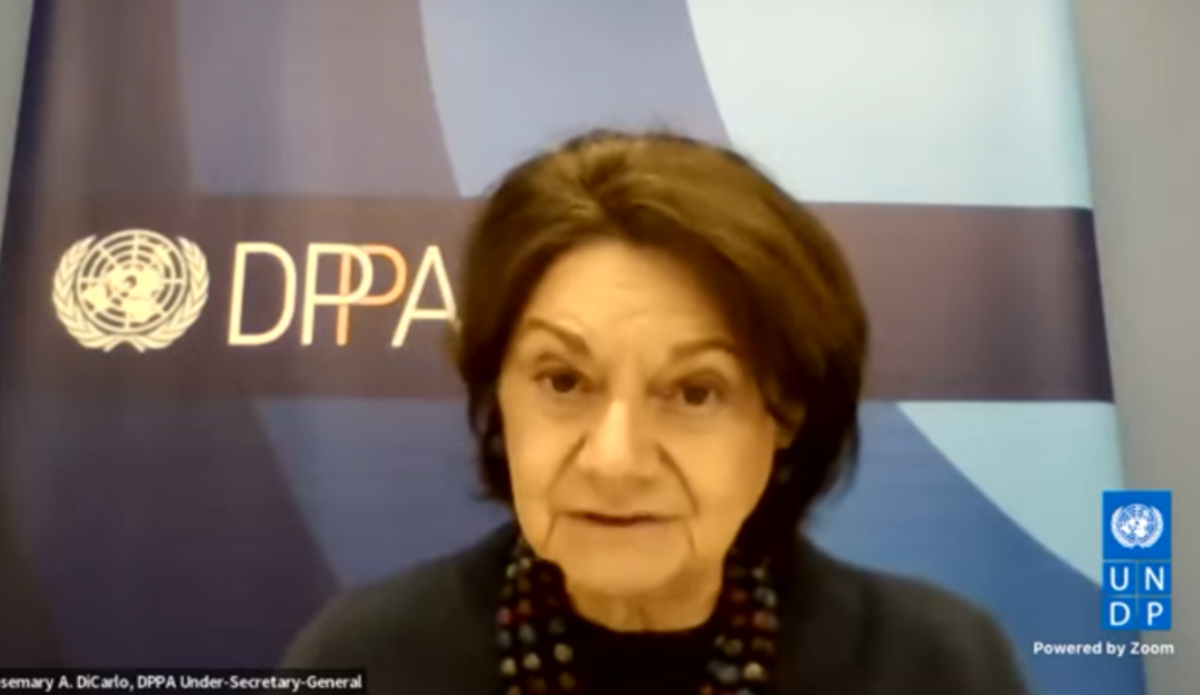President Weah,
President Vila Nova,
Excellencies,
Distinguished delegates,
I am delighted to be here today, with my colleague Achim Steiner.
I am grateful to the Deputy Secretary-General for her opening message.
I would particularly like to thank President Weah of Liberia and President Vila Nova of São Tomé and Príncipe, who have highlighted important advances in the pursuit of sustaining peace.
Excellencies,
Violent conflicts have become more complex, regionalized, fragmented and protracted. Civilians bear the brunt, and women and girls do so disproportionately.
Geopolitical tensions are undermining trust and our ability to respond to challenges collectively.
The COVID-19 pandemic has exacerbated existing risks. Alongside the climate emergency and increasing technological disruption, the virus has altered and magnified the challenge of prevention.
Yet at a global level we spend much more energy and resources on managing conflicts than on preventing them. As the Secretary-General told the General Assembly as he presented his priorities for 2022 recently, we need to review our priorities and resources across the peace continuum and strengthen our investment in conflict prevention and peacebuilding.
Excellencies,
Since its creation in 2004, the UNDP-DPPA Joint Programme has engaged with national partners, UN Resident Coordinators and Country Teams, to do precisely this: invest in prevention and peacebuilding.
Considered groundbreaking when it started, the Joint Programme today deploys over 120 Peace and Development Advisers (PDAs), including 40 national peace and development officers, across 70 countries.
Last year, over 80% of our PDAs supported COVID-19 responses. This is in recognition of the profound impact the pandemic could have on social cohesion and sustainable development.
And PDAs continue working with national stakeholders to strengthen national mechanisms, structures and capacities for inclusive dialogue, social cohesion and reconciliation.
There are several areas to highlight.
First, PDAs are working to enhance women’s participation in political processes and wider youth involvement in peacebuilding.
In Kenya, the PDA worked to support the establishment of a Women Mediation Network to enhance women’s political leadership and contribution to sustaining peace. The network is now part of the wider African Women Leaders’ Network.
In Tunisia, our team conducted a series of innovative consultations using various digital platforms. These dialogues allowed young people from around the country to express their aspirations and discuss existing barriers to youth participation in public life.
Second, PDAs are also exploring new initiatives to address hate speech and disinformation, which have risen dramatically during the pandemic, fueling distrust and conflict.
In Sri Lanka, the PDA team is supporting UNDP and UNICEF in working with the Ministry of Mass Media to enhance national capacity to monitor and counter hate speech and explore partnerships with social media companies.
In Côte d’Ivoire, during the 2020 electoral period, the PDA teamed up with a social media company to facilitate training for Ivoirian women activists, bloggers and influencers on countering hate speech. The group successfully disseminated counter narratives and ensured that videos and text containing harmful content were taken down.
And finally, in a number of climate-stressed regions, PDAs are working to include climate-related risks in peacebuilding programming.
In the South Pacific, the PDA team supports a project with governments and the Pacific Islands Forum, funded by the Peacebuilding Fund, to help scale local solutions in the face of sea-level rise and extreme weather.
Excellencies,
PDAs are natural bridges between the UN’s Peace and Security Pillar and the Development System. These talented women and men show through their daily work that lasting peace, social and economic development and people’s right to have a say in the matters that concern them are inextricably linked.
Important work is underway in many countries. However, we need to multiply our efforts and continue to deepen our partnerships. With your engagement, I am convinced the Joint Programme can provide even better support to Member States in preventing conflicts and sustaining peace.
Thank you.

